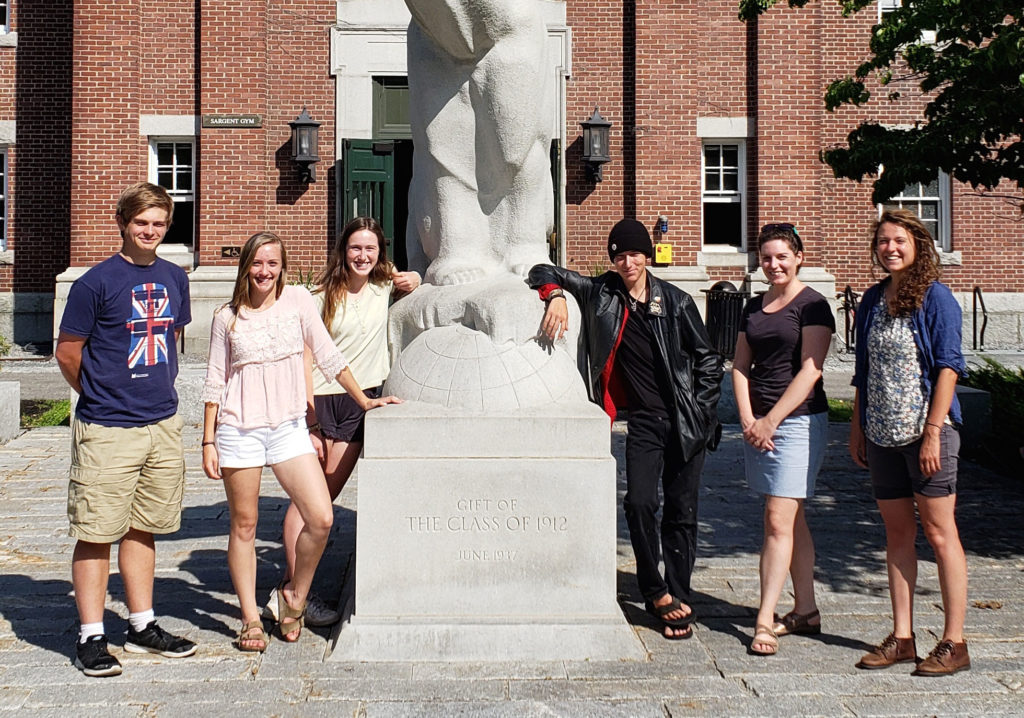As the air starts getting cooler and the days grow shorter, we know that the dog days of summer are coming to an end—and that means students going back to school. College students are now headed off to campus, high school pre-season has started, and the nervous back-to-school jitters are kicking in. For many students, summer means relaxation, catching up with friends, and not thinking about school, but four students in our Mentoring, Access and Persistence program (MAP) gave up three of their summer vacation days to immerse themselves in all things college during our MAP Summer Leadership Intensive at Bowdoin College.

Island Institute
MAP19 Summer Leadership students at Bowdoin College
The Mentoring, Access and Persistence—or MAP—program provides scholarship and transition support to Maine island students as they explore their next steps after high school. As part of this program, we ask students to complete the Summer Leadership Intensive, or an equivalent to this training, between their Junior and Senior year of high school to help them understand the elements and importance of leadership in their everyday lives.
Because “leadership” is such a buzz word and is seen everywhere from job descriptions and self-help books to sports teams and college applications, it’s important for students to understand what that word really means to them. One common definition is “the act of motivating a group of people to act towards achieving a common goal.” Before sharing this definition, we took some time asking the students to develop their own. Definitions of leadership from students included:
- The ability to guide others in a constructive way
- The act of taking the lead
- The ability to work and cooperate with peers to achieve a goal
- Organizing a group or initiative to reach a collaborative goal
- The act of motivating a group of people
- Taking responsibility for helping a group succeed
It was clear to me that these students were already thinking bigger than standard definitions, and this training allowed for deeper thinking about themselves as leaders in their academic careers, social lives, and communities.
Successful leadership starts with the “self,” and this training allowed students the opportunity to take time to reflect on their strengths and how to use them. We did several “leadership personality” quizzes and a learning style “test” to help students understand a little bit more about themselves. We also had some great conversations about introverts and extroverts and how those qualities play into leadership. We watched several TEDTalks and even visited the Peary-MacMillan Arctic Museum on campus to observe and discuss examples of everyday leadership.
Learning about the college admissions process
As part of our time on campus, Bowdoin Admissions helped students understand the thinking behind the college admissions process. Students were given three fictitious student applications to read through and score. What students decided overall was that test scores and academic ranking didn’t really play as big of a role in the overall decision-making process as they had first thought. Instead, the idea of leadership—in and out of school (like community service and volunteering)—stood out more to students than a perfect SAT score.

Island Institute
Students working hard in the Bowdoin College Admissions office as they read through fictitious college applications as part of a case study exercise
The College Fair
The Bowdoin Upward Bound program graciously welcomed us with open arms when we first arrived on campus. This program, funded through the U.S Department of Education, helps first generation students get into and succeed in college. Not only did MAP students connect with peers from across the state, but this partnership allowed them to gain insight into the college interviewing process by giving them the opportunity to do mock interviews with college representatives during the college fair, where over 30 universities and colleges were represented.

Island Institute
College Fair and mock college interviews in the Student Union at Bowdoin College
Connecting as a cohort
Whether our MAP students were having in-depth conversations on topics ranging from personal finances to feminism, playing Frisbee and soccer, or eating Goldfish, Rolos, and “buff chix” sandwiches together in the dining hall, this training really helped them connect as a cohort and allowed their unique leadership skills to shine. I can’t wait to see these soon-to-be seniors put their leadership skills to use in the classroom and their communities—both this fall and in the future—and I look forward to connecting with them again soon as we kick off our MAP monthly webinar series next month.


